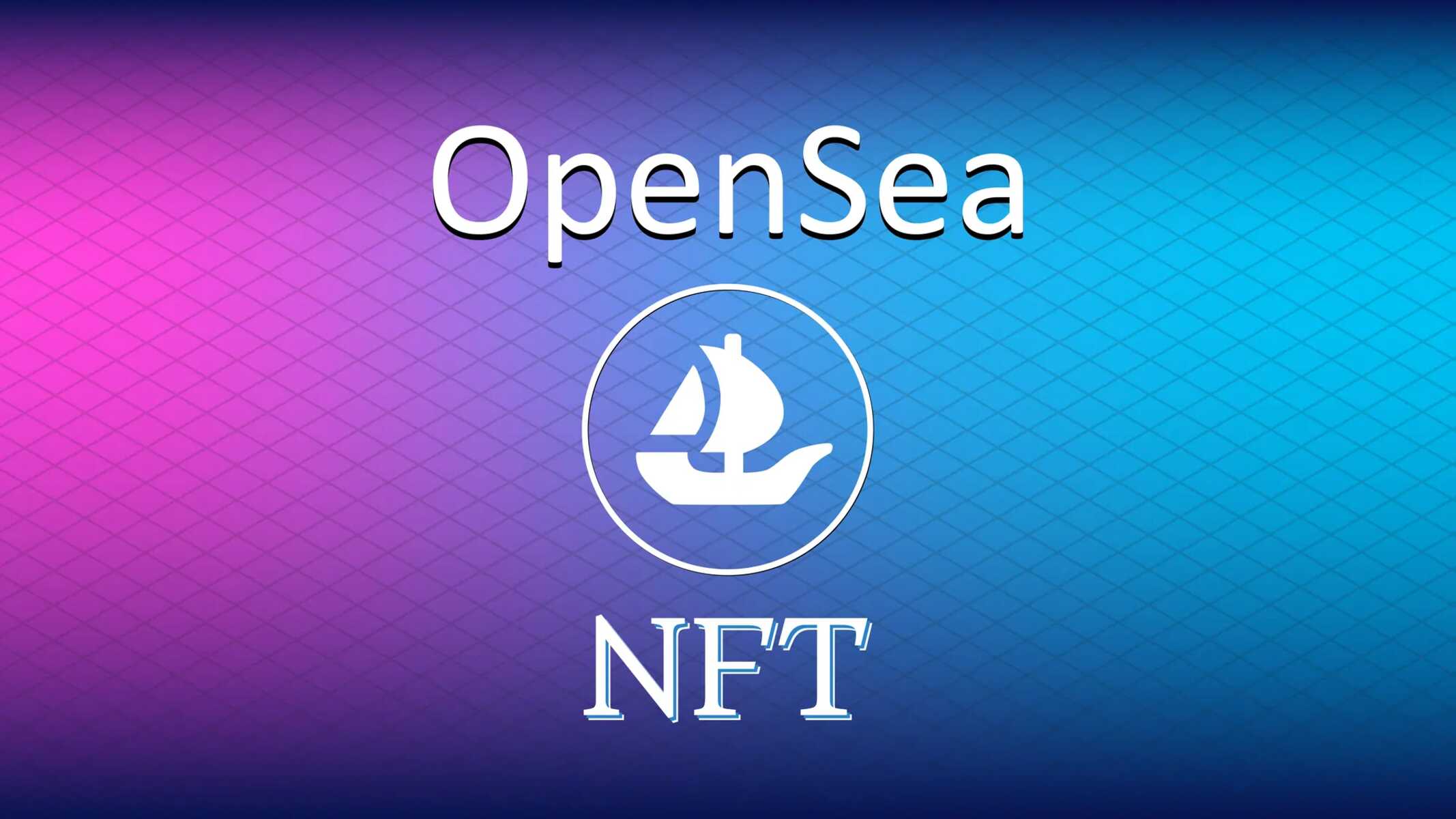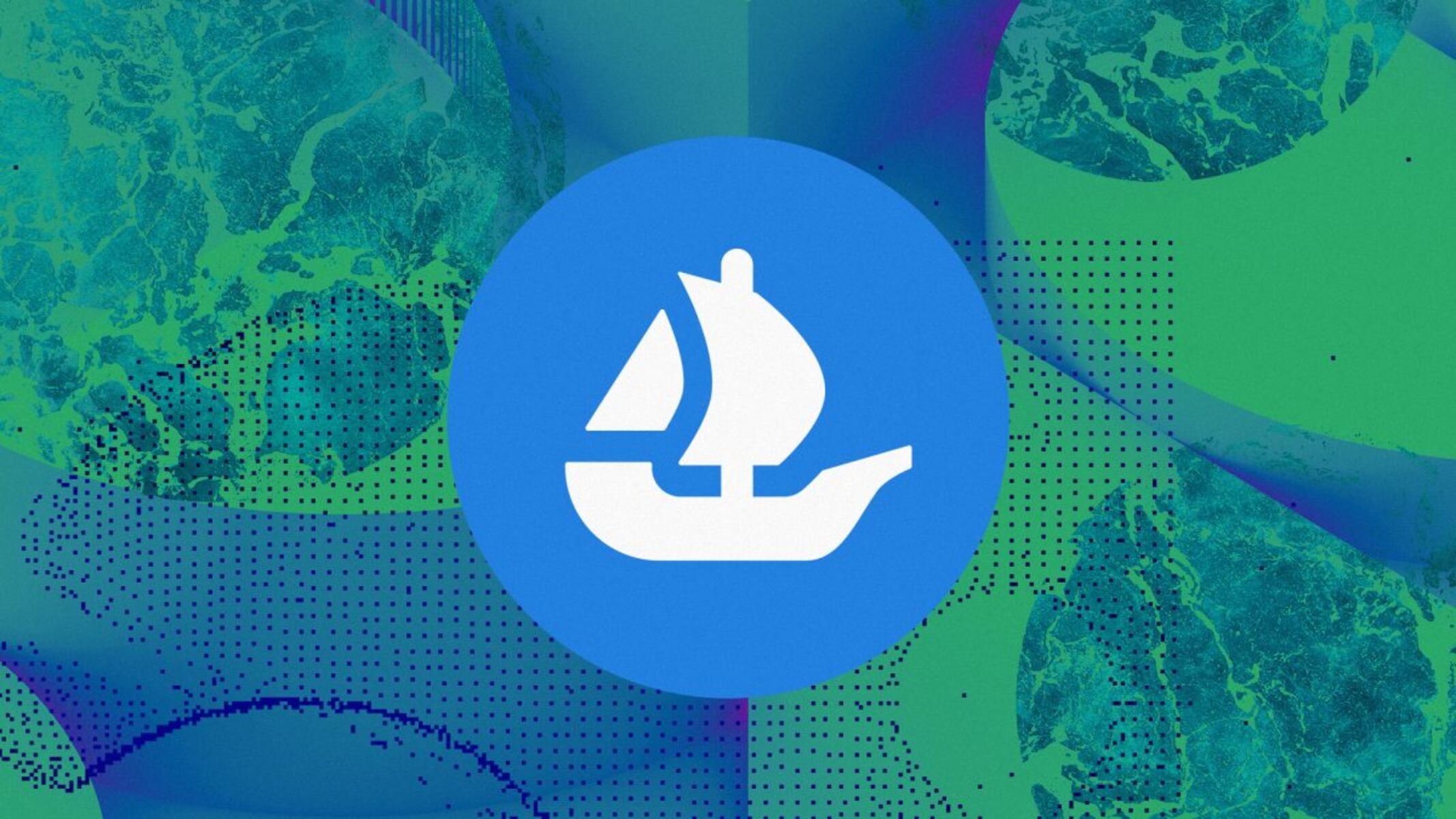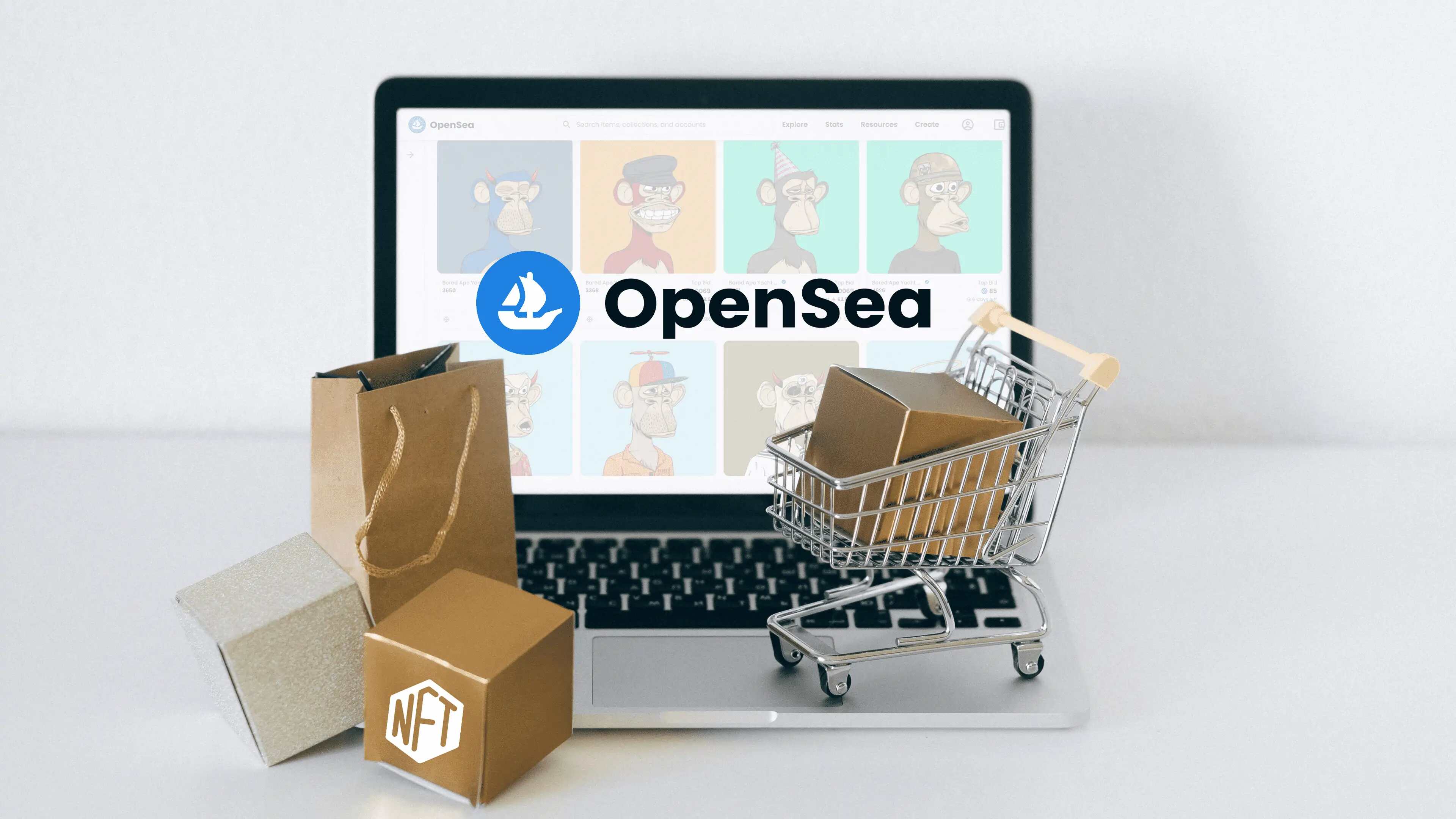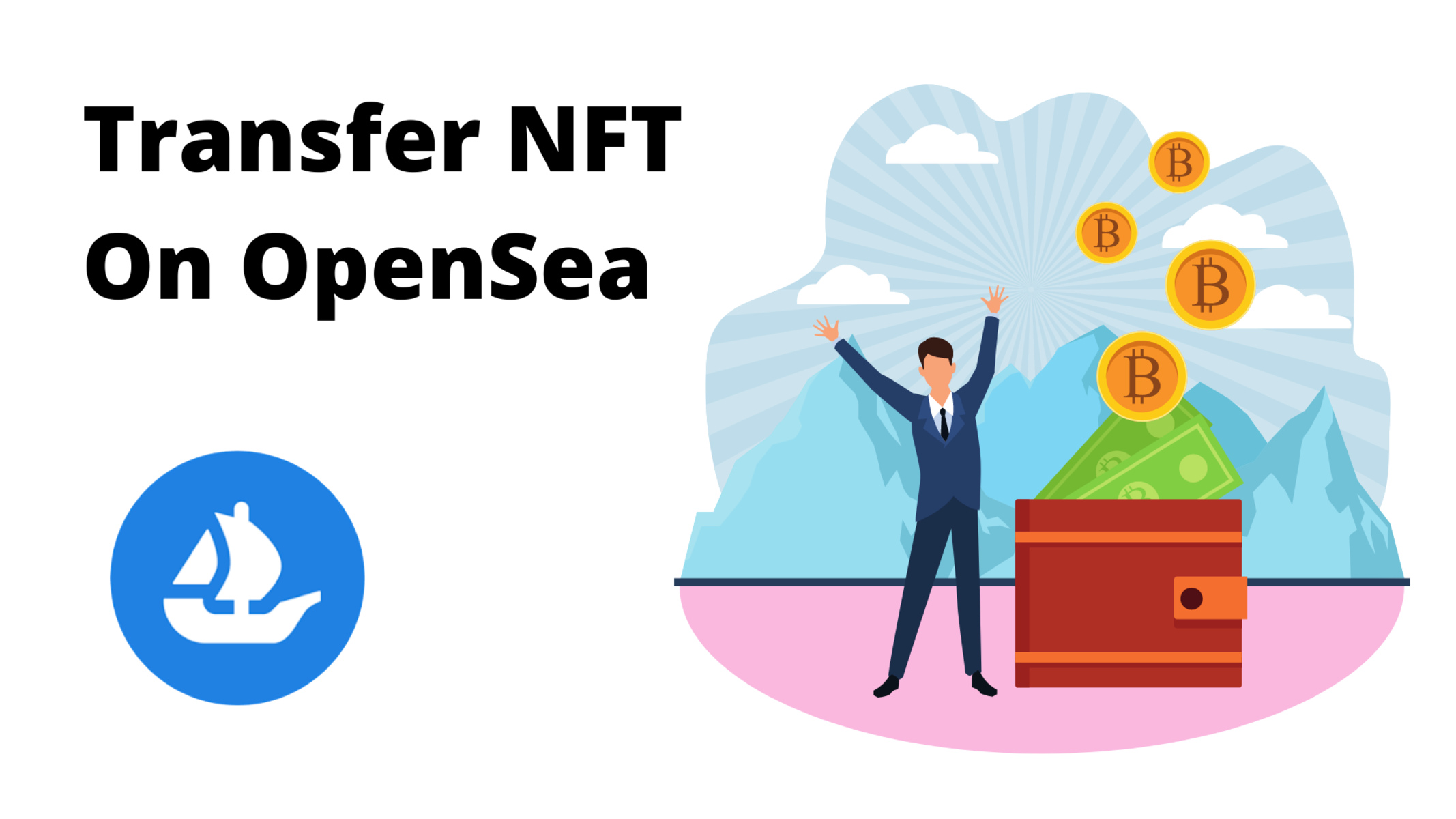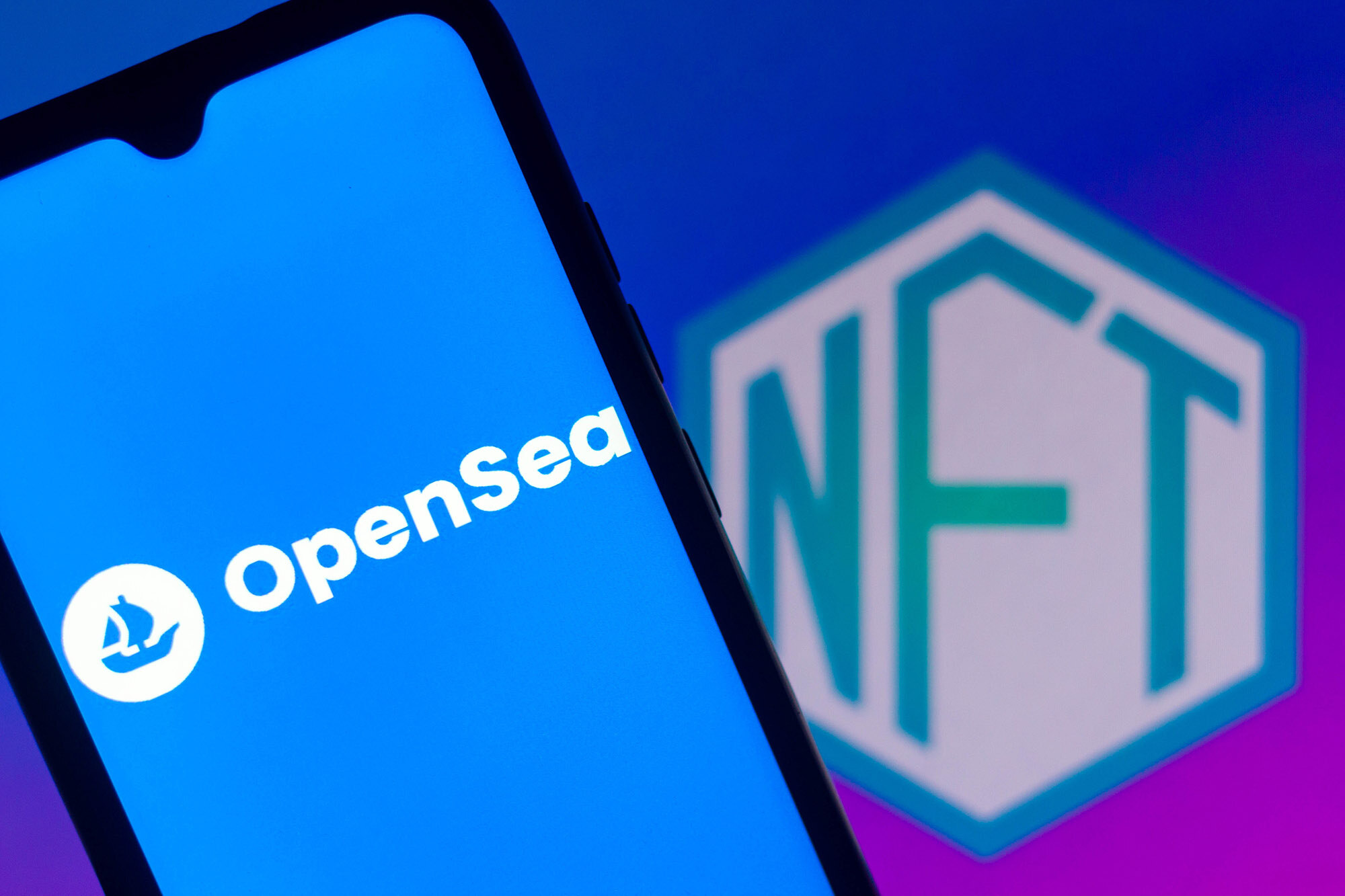Introduction
Welcome to the fascinating world of Non-Fungible Tokens (NFTs)! Over the past couple of years, NFTs have gained immense popularity, revolutionizing the way we perceive and trade digital assets. One of the prominent platforms driving this NFT wave is OpenSea. In this article, we will delve into the world of OpenSea and explore the ins and outs of this groundbreaking marketplace.
NFTs, or Non-Fungible Tokens, are unique digital assets that are stored on a blockchain, typically the Ethereum blockchain. Unlike cryptocurrencies like Bitcoin or Ethereum, which are fungible and can be exchanged one for another, each NFT holds distinct value and cannot be replaced by something else. This uniqueness and rarity make NFTs highly sought after by collectors and enthusiasts.
OpenSea, founded in 2017, is the world’s first and largest decentralized marketplace for NFTs. It serves as a hub where users can buy, sell, and trade a wide variety of digital assets, including virtual art, domain names, collectibles, and more. OpenSea has garnered a significant user base and has become the go-to platform for both creators and buyers looking to enter the NFT ecosystem.
With OpenSea’s intuitive user interface and extensive selection of assets, users can easily navigate through the vast marketplace and discover unique NFTs that align with their interests. Whether you’re an art enthusiast looking to collect digital artworks or a digital creator seeking a platform to showcase and monetize your creations, OpenSea offers a seamless experience for all.
As the NFT market continues to grow at a rapid pace, OpenSea remains at the forefront, empowering artists, creators, and collectors to explore the potential of these digital assets. In the following sections, we will take a closer look at how OpenSea works, the process of buying and selling NFTs on the platform, its notable features, fees, partnerships, and more. So buckle up and join us on this adventure into the world of OpenSea!
What are NFTs?
If you’ve been following the latest trends in the digital world, you may have come across the term “NFT” or Non-Fungible Token. But what exactly are NFTs and why have they become the talk of the town?
In simple terms, NFTs are unique digital assets that represent ownership or proof of authenticity of a specific item or piece of content. Unlike cryptocurrencies such as Bitcoin or Ethereum, which are fungible and can be exchanged on a one-to-one basis, NFTs are indivisible and cannot be exchanged for another token of the same value.
What makes NFTs truly stand out is their ability to establish provable scarcity and ownership over digital assets. Each NFT is assigned a one-of-a-kind identifier and is stored on a blockchain, typically the Ethereum blockchain. This means that the ownership and transaction history of an NFT can be easily verified, providing creators and collectors with a level of transparency and security that was previously unheard of in the digital realm.
NFTs can represent a wide range of digital content, including art, music, videos, virtual real estate, virtual goods, and more. They have opened up new possibilities for creators to monetize their digital creations and for enthusiasts to collect and invest in unique digital assets.
The value of an NFT is largely driven by its perceived scarcity and demand from collectors. Just like traditional art or collectibles, rarity plays a significant role in determining the market value of an NFT. Additionally, the reputation and popularity of the creator or the underlying content can also impact the value of an NFT.
While NFTs have gained considerable attention in the art world, their applications extend far beyond that. They have the potential to revolutionize industries such as gaming, music, fashion, and more by providing new avenues for creators to engage with their audience and monetize their work.
It’s important to note that owning an NFT does not grant copyright or intellectual property rights to the underlying content. The creator of the NFT retains those rights, and purchasing an NFT is essentially buying a token that represents ownership or proof of authenticity.
Now that you have a better understanding of what NFTs are, let’s explore the world of OpenSea and how this platform has become a leading marketplace for buying, selling, and trading these unique digital assets.
What is OpenSea?
OpenSea is a decentralized marketplace specifically designed for trading Non-Fungible Tokens (NFTs). It is the largest and most popular platform of its kind, providing a user-friendly interface and a vast selection of digital assets for buyers, sellers, and collectors.
Founded in 2017 by Devin Finzer and Alex Atallah, OpenSea was created to address the growing demand for a dedicated marketplace that simplifies the process of buying, selling, and trading NFTs. The platform operates on a decentralized model, meaning that transactions occur directly between buyers and sellers without the need for intermediaries.
OpenSea supports a wide range of digital assets, including virtual art, collectibles, game items, domain names, music, virtual real estate, and much more. With an increasing number of creators and collectors embracing the NFT revolution, OpenSea has become a hub for exploring, discovering, and engaging with these unique digital assets.
One of the key features that set OpenSea apart is its compatibility with the Ethereum blockchain. The platform utilizes smart contracts to ensure the security and transparency of transactions, allowing users to trust in the authenticity and ownership of the NFTs they trade.
OpenSea also provides various tools and features to facilitate a seamless trading experience. Users can easily search and filter through the vast marketplace, discover trending NFTs, and access detailed information about each asset. Additionally, OpenSea offers built-in wallets, enabling users to securely store and manage their NFT collections directly on the platform.
As a testament to its popularity and success, OpenSea has witnessed significant growth and has gained recognition as the go-to platform for NFT enthusiasts. The marketplace boasts a large and active community of creators, collectors, and buyers, fostering a vibrant ecosystem that continues to evolve and expand.
OpenSea’s mission goes beyond simply providing a marketplace. The platform strives to empower artists and creators by offering them a platform to showcase their work and generate revenue from their digital assets. Likewise, it offers collectors an opportunity to own and trade unique digital items and connect with like-minded individuals who share their interests.
Now that we have a clearer understanding of what OpenSea is, let’s dive deeper into how this innovative marketplace works and explore the intricacies of buying, selling, and trading NFTs on the platform.
How does OpenSea work?
OpenSea operates on a decentralized model, utilizing blockchain technology, specifically the Ethereum blockchain, to enable the buying, selling, and trading of NFTs. The platform provides a seamless and intuitive user interface that simplifies the process for both beginners and experienced users.
When a user visits OpenSea, they can browse through a vast array of digital assets listed for sale. These assets can range from virtual art, collectibles, game items, domain names, music, and more. Each NFT has its own dedicated page, showcasing key details such as the creator, description, image or video, and the current price.
Buying NFTs on OpenSea is straightforward. Users can search for specific assets or explore various categories to find something that catches their interest. Once they identify an NFT they want to purchase, they can click on it to view more details and assess its value. If they decide to proceed with the purchase, they can use their Ethereum wallet to connect to the platform and complete the transaction.
Similarly, selling NFTs on OpenSea is a relatively simple process. Artists and creators can mint their digital assets as NFTs by following the platform’s guidelines. They can upload their artwork or other digital content, provide detailed descriptions, set a price, and choose whether to sell it immediately or auction it off to the highest bidder.
OpenSea allows users to list their NFTs for sale either at a fixed price or in an auction format. When choosing the auction option, sellers can set the starting bid, the duration of the auction, and any minimum increase in bids. This provides flexibility and competitive bidding opportunities, allowing sellers to potentially maximize the value of their NFTs.
Once a buyer initiates a purchase or wins an auction, the transaction occurs directly between the buyer and the seller. OpenSea acts as the intermediary, ensuring the security and transparency of the transaction through the use of smart contracts. These smart contracts facilitate the transfer of ownership and ensure that only the rightful owner has access to the NFT.
OpenSea also provides additional features to enhance the trading experience. Users can create collections to organize their NFTs, follow their favorite creators and receive updates on their latest releases, and even participate in virtual events and collaborations within the OpenSea community.
Furthermore, OpenSea’s compatibility with various Ethereum-based wallets allows users to manage their NFT collections securely. Popular wallets such as MetaMask, Coinbase Wallet, and WalletConnect can be seamlessly integrated with the platform, ensuring a smooth and secure experience for users.
Overall, OpenSea revolutionizes the way NFTs are bought, sold, and traded by providing a user-friendly platform that leverages blockchain technology to offer transparency, security, and a wide range of digital assets. Whether you’re an artist looking to monetize your creations or a collector searching for unique NFTs, OpenSea has established itself as a leading marketplace in the NFT ecosystem.
Buying NFTs on OpenSea
Buying Non-Fungible Tokens (NFTs) on OpenSea is a straightforward and exciting process that allows users to explore and add unique digital assets to their collections. Whether you’re an art enthusiast, a collector, or simply someone looking to delve into the world of NFTs, OpenSea offers a wide variety of options to suit your interests and budget.
When browsing on OpenSea, you can search for specific NFTs or explore different categories to discover assets that catch your eye. The platform’s user interface is designed to make the browsing experience intuitive and seamless, allowing you to easily navigate through the vast marketplace.
Each NFT has its own dedicated page, providing essential details and visuals to help you make an informed decision. You can view the creator, description, images or videos, and information about the NFT’s ownership history and provenance. These details empower buyers to assess the value and authenticity of the NFT before making a purchase.
Once you find an NFT that you’re interested in, you can click on it to access its dedicated page. There, you will find additional information about the NFT, including its current price and any bidding options if it’s listed for auction.
To proceed with the purchase, you’ll need an Ethereum wallet. OpenSea is compatible with various wallets, such as MetaMask, Coinbase Wallet, and WalletConnect. By connecting your wallet to OpenSea, you gain access to your funds and can interact with the Ethereum blockchain to complete the transaction.
When you’re ready to buy, you’ll need to confirm the purchase details and verify the transaction through your connected wallet. Just like when buying other cryptocurrencies or making digital transactions, you may need to pay a transaction fee, known as “gas,” to cover the Ethereum network costs. The gas fee ensures that the transaction is processed on the blockchain in a timely manner.
Once the transaction is confirmed, the ownership of the NFT is transferred to your Ethereum wallet address. It’s important to double-check the wallet address before finalizing the purchase to ensure that you receive the NFT in the correct wallet.
As the proud new owner of an NFT, you can decide whether to keep it in your Ethereum wallet or display it in a digital gallery or marketplace compatible with NFTs. OpenSea provides built-in functionalities for managing and showcasing your NFTs, making it easy to keep track of your collection and share your unique digital assets with others.
Buying NFTs on OpenSea is a thrilling experience that allows users to engage with creators, support artists, and collect one-of-a-kind digital assets. With a user-friendly interface, transparent transaction process, and an extensive selection of NFTs, OpenSea has established itself as a trusted and popular marketplace for NFT enthusiasts.
Selling NFTs on OpenSea
Selling your Non-Fungible Tokens (NFTs) on OpenSea offers creators and collectors a platform to showcase their digital assets and monetize their work. Whether you’re an artist looking to sell your artwork or a collector interested in parting with a valuable NFT, OpenSea provides a seamless and accessible process for selling your digital assets.
To begin selling on OpenSea, the first step is to create an account or connect your Ethereum wallet to the platform. This ensures that you can securely list your NFTs and manage your sales directly through OpenSea’s interface.
Once you’re ready to sell an NFT, you can navigate to your collection within OpenSea. From there, you can select the asset you wish to sell and proceed with listing it for sale. OpenSea offers two primary selling options: setting a fixed price or auctioning off the NFT.
With a fixed price listing, you can set a specific price that you believe reflects the value of your NFT. Buyers can then purchase it instantly at the listed price without engaging in a bidding process. This option provides a straightforward and efficient way to sell your NFTs to interested buyers.
Alternatively, you can choose to auction your NFT. Auctions on OpenSea enable potential buyers to bid on your asset, driving up its price through competitive bidding. When creating an auction, you can set parameters such as the starting bid, the duration of the auction, and any minimum increments for subsequent bids.
During the auction period, interested buyers can place bids on your NFT, incrementally increasing the price until the auction ends. Once the auction concludes, the highest bidder becomes the new owner of the NFT. It’s worth noting that accepting a bid on an auction is a binding agreement, so it’s important to carefully consider all offers before finalizing the sale.
While your NFT is listed for sale or auction on OpenSea, potential buyers can browse and discover your asset through the platform’s search and category features. They can view detailed information, including images or videos, descriptions, and ownership history. This visibility ensures that your NFT gets exposure within the OpenSea community, increasing its chances of attracting interested buyers.
When a buyer decides to purchase your NFT, the transaction occurs directly between you and the buyer. OpenSea acts as the intermediary, ensuring the security and transparency of the transaction through the use of smart contracts. These contracts facilitate the transfer of ownership and verify the authenticity of the NFT.
Once the transaction is completed, the ownership of the NFT is transferred to the buyer’s Ethereum wallet. The funds from the sale will be deposited into your connected wallet, minus any applicable fees. It’s important to consider the fees associated with selling on OpenSea, including gas fees for Ethereum network usage and any platform fees imposed by OpenSea for facilitating the transaction.
OpenSea’s robust marketplace and active user base provide ample opportunities for creators and collectors to sell their NFTs and connect with interested buyers. Whether you’re looking to monetize your digital creations or find new homes for your collectible assets, OpenSea offers a reliable and accessible platform for selling your NFTs.
Trading NFTs on OpenSea
OpenSea not only facilitates buying and selling Non-Fungible Tokens (NFTs) but also serves as a thriving marketplace for trading these unique digital assets. Trading NFTs on OpenSea allows collectors and enthusiasts to engage in the dynamic NFT ecosystem, explore new opportunities, and discover valuable additions to their collections.
OpenSea offers a range of trading options to cater to different preferences and strategies. One popular method of trading on the platform is through direct sales. Users can list their NFTs for a fixed price, providing interested buyers the opportunity to purchase the asset immediately at the listed price. This straightforward trading method is ideal for buyers who desire a hassle-free purchasing experience.
Another method of trading on OpenSea is through auctions. Sellers can create NFT auctions where interested buyers can bid on the asset, driving up its price through competitive bidding. Auctions introduce an element of excitement and allow the market to determine the final value of an NFT. Sellers have control over the auction parameters, including the starting bid, duration, and minimum bid increment.
OpenSea also supports the use of bundles for trading purposes. Bundles allow users to group multiple NFTs together in a single listing, making it convenient for buyers who wish to acquire a collection of assets in one transaction. This trading method is especially popular among collectors and investors looking to diversify their portfolios.
In addition to direct sales, auctions, and bundles, OpenSea enables users to engage in peer-to-peer trading. This means that users can connect and negotiate trades directly with other individuals in the OpenSea community. This feature provides flexibility for users who prefer direct interaction and personalized trading experiences.
When trading NFTs on OpenSea, it’s important to consider factors such as the rarity, demand, and historical value of the assets. Conducting thorough research and staying informed about market trends can help users make informed trading decisions and identify opportunities for profitable trades.
To enhance the trading experience and increase the visibility of NFTs, OpenSea offers various features and functionalities. Users can create collections to curate their NFTs and showcase their favorite assets. Additionally, OpenSea’s search and filtering options allow users to discover trending and popular NFTs, making it easier to find assets that align with their interests.
As with any transaction on OpenSea, trading NFTs involves the use of Ethereum-based wallets and requires the payment of gas fees to process the blockchain transactions. It’s important to factor these costs into your trading decisions to ensure that they align with your budget and trading strategy.
OpenSea’s thriving marketplace, coupled with its diverse trading options and user-friendly interface, makes it an ideal platform for engaging in the trading of NFTs. Whether you’re a collector, investor, or trader, OpenSea provides a dynamic environment to explore, discover, and trade valuable NFTs.
OpenSea Features
OpenSea, as the leading marketplace for Non-Fungible Tokens (NFTs), offers a range of features and functionalities that enhance the buying, selling, and trading experience for its users. These features contribute to the platform’s reputation as a trusted and user-friendly destination for NFT enthusiasts. Let’s explore some of the notable features of OpenSea:
Wide Range of NFTs: OpenSea hosts an extensive selection of NFTs across various categories, including art, collectibles, game items, domain names, music, virtual real estate, and more. This diverse range of digital assets allows users to discover and explore a wide range of unique and valuable NFTs.
Intuitive User Interface: OpenSea boasts an intuitive and user-friendly interface, making it easy for users to navigate the platform and explore the marketplace. The search and filtering options enable users to quickly find specific NFTs or browse through different categories to discover new and exciting assets.
Blockchain Verification: OpenSea leverages the power of blockchain technology, specifically the Ethereum blockchain, to ensure the authenticity and ownership of NFTs. By utilizing smart contracts, OpenSea provides transparent and verifiable records of the ownership history and provenance of each NFT, giving buyers and sellers confidence in their transactions.
Built-in Wallet Integration: OpenSea seamlessly integrates with popular Ethereum-based wallets, such as MetaMask, Coinbase Wallet, and WalletConnect. This integration allows users to securely connect their wallets to OpenSea, providing a convenient and secure way to store, manage, and trade their NFT collections directly on the platform.
Collection Creation: OpenSea enables users to create customized collections to organize and showcase their NFTs. Creating a collection offers a streamlined way to curate and display artistic or thematic sets of digital assets within OpenSea’s ecosystem.
Following Artists and Creators: OpenSea allows users to follow their favorite artists and creators, receiving updates on their latest releases and new NFT drops. This feature enhances the community aspect of OpenSea, creating connections between creators and collectors and fostering a sense of engagement and collaboration within the platform.
Virtual Events and Collaborations: OpenSea often hosts virtual events, collaborations, and partnerships with renowned artists and brands. These events provide opportunities for exclusive releases, limited editions, and unique NFT drops that generate excitement and further promote the engagement of users within the OpenSea community.
Secondary Market Trading: Alongside the primary market for minting and selling new NFTs, OpenSea also supports the secondary market for trading previously owned NFTs. This allows users to access a wide range of pre-owned assets, giving collectors the chance to acquire valuable NFTs that may no longer be available for minting.
Artist Royalties: OpenSea’s smart contract technology enables creators to earn royalties on the secondary sales of their NFTs. This feature ensures that artists continue to benefit from the increasing value of their artworks, even after the initial sale.
These features collectively contribute to OpenSea’s comprehensive and user-centric approach, making it a popular choice for artists, collectors, and enthusiasts seeking to engage with the world of NFTs. OpenSea continues to evolve and introduce new features to enrich the NFT trading experience and support the growth of the NFT ecosystem.
OpenSea Fees
When using OpenSea, it’s important to understand the fees associated with buying, selling, and trading Non-Fungible Tokens (NFTs) on the platform. OpenSea implements a fee structure to support its operations and the services it provides to its users. Let’s explore the different fees users may encounter on OpenSea:
Gas Fees: Gas fees are a crucial aspect of transacting on the Ethereum blockchain, including buying and selling NFTs on OpenSea. Gas fees cover the cost of computational resources required to process and validate transactions. The fees vary depending on the network congestion and complexity of the transaction. Users need to consider gas fees when executing transactions on OpenSea as they can fluctuate based on the demand for Ethereum network resources.
List Fee: OpenSea charges a list fee when a user lists an NFT for sale. This fee helps cover the operational costs of the platform. The list fee is a fixed amount that sellers pay upfront when listing their NFTs. The fee is deducted from the seller’s Ethereum wallet balance upon successful listing.
Transaction Fee: OpenSea also imposes a transaction fee on each successful sale that occurs on the platform. The transaction fee is usually a percentage of the final sale price of the NFT. This fee goes towards supporting and maintaining OpenSea’s infrastructure and services.
Platform Fees: In addition to the list fee and transaction fee, OpenSea may charge platform fees on certain types of NFT sales or services. These fees vary based on the specific circumstances and are disclosed to users during the transaction process. Platform fees contribute to the ongoing development, enhancement, and support of OpenSea’s marketplace.
It’s important for users to keep these fees in mind when buying or selling NFTs on OpenSea, as they can impact the overall cost and profitability of transactions. Considering the fees and their impact on the total transaction cost helps users make informed decisions regarding pricing, bidding, and evaluating the potential profitability of selling or trading NFTs.
It’s worth noting that OpenSea is transparent about its fee structure, displaying applicable fees clearly during the listing and transaction processes. Users can review the fees before confirming any transaction. It’s always recommended to review and understand the fees associated with each transaction to avoid any surprises or misunderstandings.
OpenSea’s fee structure allows the platform to continue providing a robust and reliable marketplace for NFT enthusiasts. By supporting the platform through these fees, users can enjoy the benefits of transparent transactions, secure ownership verification, and a growing ecosystem of NFT creators and collectors.
OpenSea Partnerships
OpenSea, as the leading marketplace for Non-Fungible Tokens (NFTs), has established strategic partnerships to enhance the platform’s offerings and expand opportunities for creators and collectors. Through these partnerships, OpenSea has collaborated with prominent brands, artists, and organizations to bring exclusive NFT releases, limited editions, and unique experiences to its users. Let’s explore some notable partnerships that have shaped the OpenSea ecosystem:
Artists and Content Creators: OpenSea has collaborated with a wide range of artists and content creators from various fields. This includes established artists, digital creators, musicians, and celebrities who have sought to embrace the NFT revolution. These partnerships have introduced unique, exclusive, and innovative NFT releases from renowned creators, attracting collectors and enthusiasts alike.
Brands and Intellectual Property: OpenSea has partnered with recognizable brands and intellectual properties to bring official NFT collections to the platform. These partnerships allow fans and collectors to own digital assets associated with iconic brands, franchises, and characters. By leveraging these partnerships, OpenSea has expanded the range of NFT offerings and created exciting opportunities for brand engagement.
Sports and Athletes: OpenSea has collaborated with sports organizations and athletes to tap into the world of sports memorabilia on the blockchain. Through these partnerships, collectors can acquire digital assets tied to sports events, legendary moments, and the profiles of beloved athletes. This integration of sports and NFTs has opened new avenues for fans to connect with their favorite sports teams and athletes.
Blockchain Projects and Platforms: OpenSea has formed alliances with other blockchain projects and platforms to foster interoperability and innovative NFT experiences. These partnerships enable seamless integration with various blockchain networks, expanding the reach and accessibility of NFTs beyond the Ethereum blockchain. Collaborations with other platforms also introduce new functionalities and features to enhance the trading and ownership experience for OpenSea users.
Celebrities and Influencers: OpenSea has teamed up with celebrities and influencers in various industries, bringing additional exposure and attention to the world of NFTs. These partnerships have helped spread awareness and drive mainstream adoption of NFTs, attracting new audiences to the OpenSea platform. Collaborations with well-known figures have also resulted in exclusive NFT drops and engaging experiences for fans.
These partnerships have contributed to the growth and vibrancy of the OpenSea ecosystem, expanding the possibilities and potential of NFTs for creators and collectors. By collaborating with renowned brands, artists, athletes, and influential individuals, OpenSea continues to push the boundaries and shape the future of the NFT landscape.
OpenSea’s partnerships not only bring exclusive offerings and experiences to users but also showcase the platform as a trusted and sought-after destination for NFT enthusiasts. As the NFT market evolves, we can expect OpenSea to continue forging strategic partnerships that further enrich the ecosystem and create new opportunities for the diverse community of creators and collectors.
Conclusion
OpenSea has emerged as a trailblazer in the world of Non-Fungible Tokens (NFTs), providing a decentralized marketplace that empowers creators, collectors, and enthusiasts to explore, buy, sell, and trade unique digital assets. As showcased throughout this article, OpenSea offers a range of features and functionalities that contribute to its success and popularity in the NFT ecosystem.
With its wide variety of NFT categories, intuitive user interface, and extensive partnerships, OpenSea provides a platform for artists, collectors, and brands to engage with the emerging digital art and collectibles market. Whether you’re a digital creator looking to monetize your creations, a collector searching for unique assets to add to your collection, or an enthusiast eager to explore the cutting-edge world of NFTs, OpenSea offers a dynamic and inclusive environment.
Through blockchain verification and transparency, OpenSea ensures the authenticity and ownership of NFTs, offering peace of mind to both buyers and sellers. The platform’s integration with popular Ethereum wallets provides a seamless and secure experience for users to manage their NFT collections and engage in transactions.
OpenSea’s partnerships with artists, brands, celebrities, and sports organizations have brought exclusive releases, limited editions, and engaging experiences to its users. These collaborations have expanded the possibilities and appeal of NFTs, drawing mainstream attention and driving the growth of the NFT market.
As the NFT landscape continues to evolve, OpenSea remains at the forefront, continuously embracing innovation and providing a trusted and vibrant marketplace for the NFT community. With its commitment to transparency, user-friendly interface, and ever-growing selection of digital assets, OpenSea has solidified itself as a go-to platform for NFT enthusiasts around the world.
Whether you’re an artist looking for a platform to showcase your creations, a collector searching for unique digital assets, or a curious individual interested in exploring the world of NFTs, OpenSea offers a gateway into the exciting and ever-expanding realm of NFTs. Take the plunge and embark on a journey of discovery, creativity, and possibilities with OpenSea, where the world of digital assets awaits.










